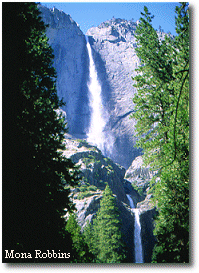| How To | What's Wrong with this Wilderness? | Safety |
 Every year
hundreds of thousands of us flock to the wilderness areas
of this country to immerse our body and soul in the
"tonic of wilderness." These pristine areas
return us to our roots, remind us of our ties to the
earth and its community of life, and provide sanctuaries
for ecological systems to function without change. They
are our heritage and our responsibility. Every year
hundreds of thousands of us flock to the wilderness areas
of this country to immerse our body and soul in the
"tonic of wilderness." These pristine areas
return us to our roots, remind us of our ties to the
earth and its community of life, and provide sanctuaries
for ecological systems to function without change. They
are our heritage and our responsibility. - Learn how to protect Yosemite on a wilderness trip. - Learn how to protect yourself on a wilderness trip. - See if you can determine what is wrong with each cartoon. |
Before Your Trip
• Choose
a destination four trail miles from Tuolumne Meadows,
Yosemite Valley, Glacier Point, Hetch Hetchy or Wawona,
or one trail mile from any road. Camping is prohibited in
the Dana Fork of the Tuolumne River. • Keep group size to 15 people or
less or 8 people maximum for any cross country hiking
more than 1/4 mile off any trail. • Get your wilderness
permit. They are required for all overnight
wilderness use. • Leave your pets or weapons at home.
Yosemite is a wildlife preserve. Remember, it is the
animals' home - you are the visitor, and pets are not
welcome. • Pack carefully - repackage to
eliminate excess food packaging, foil, glass, etc. Leave
no trace in the wilderness! • Do not bring bicycles or strollers.
Mechanized vehicles (even human powered ones) are not
allowed in the wilderness.
• Stock animals
have the right of way. Stand still on the uphill side of
the trail to allow them to pass. • Help maintain the trail system.
Cutting switchbacks, "short cuts," or walking
outside a wet trail cause hazardous conditions and trail
destruction.
• Camp away from fragile, untrampled vegetation. • Limit your use of wood fires. Campfires are not allowed above 9600' due to wood scarcity and potential resource damage. Below 9600', they may be built in existing fire rings. Burn only dead and down wood. Please use stoves when ever possible. • Protect water quality. Bury any human waste 6" deep and at least 100' from water sources, camp areas or trails. Pack out all toilet paper. Do all washing 100 feet from water. • Purify any drinking water by boiling 3-5 minutes or using a giardia-rated filter or iodine based chemical purifier. • Do not put anything in the water; even "biodegradable" soap pollutes. • Do not build rock walls, bough beds, new fire rings, trenches, or campsite "improvements." • Pack out everything you carry in. Please do not burn trash. • Safeguard your food and the animals. Follow the Food Storage instructions.
|
http://www.nps.gov
File created 9/99 Hayes Roberts
Updated
Yosemite National Park Division
of Interpretation